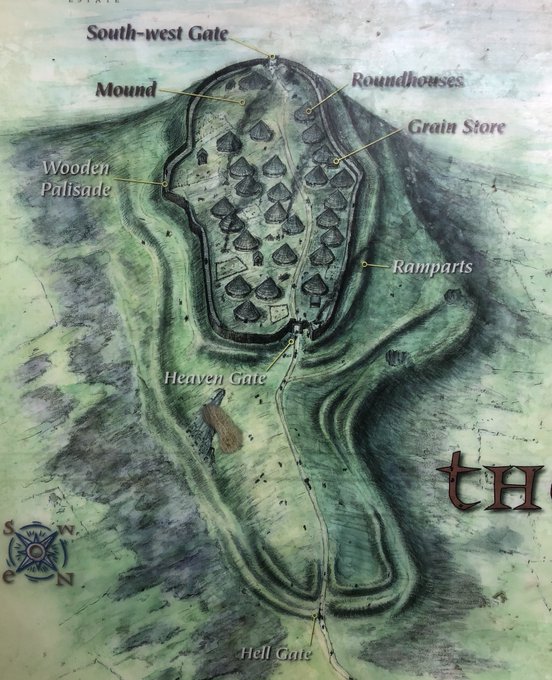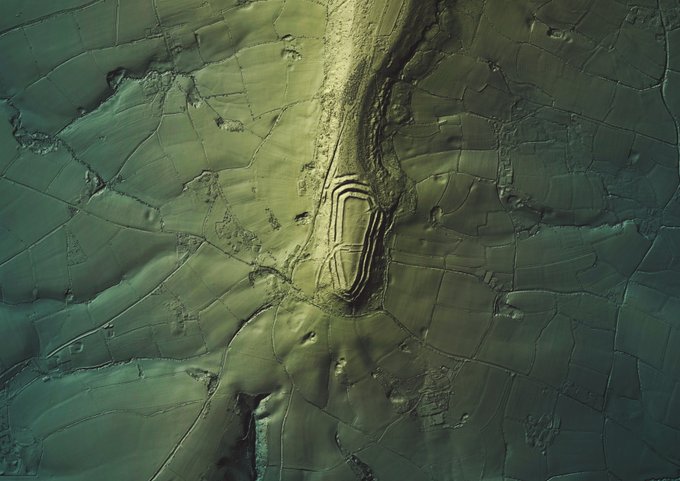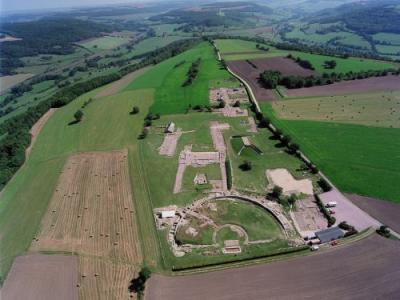hillfortのTwitterイラスト検索結果。 101 件中 2ページ目
The Wrekin in Shropshire boasts two Iron Age hillforts at its summit. Unusually, one is enclosed by the other. The outer hillfort is multivallate, the inner univallate. The NE entrances are known as Hell Gate and Heaven Gate respectively.
#HillfortsWednesday
#Archaeology
Iron Age activity at the centre of Danebury hillfort is a little more difficult to reconstruct
Here in an image from the 1986 @hantsconnect guide © David Salariya memorably depicts a pony being taken to *meet its maker* at the central shrines 😱
#HillfortsWednesday
These evocative recreations © David Salariya for the 1986 @hantsconnect guide to Danebury hillfort #Hampshire convey a sense of everyday Iron Age life 🤩 (although I confess the cutaway effect of the storage pit in the last image hurts my head a tad)
#HillfortsWednesday
The east gate of Danebury hillfort around 100 BC, at the moment of speculative attack, is depicted in this reconstruction painting by Karen Guffogg for the excellent 1993 @BatsfordBooks @EnglishHeritage book on Danebury by Barry Cunliffe
#HillfortsWednesday
An aerial view of the East gate of Danebury hillfort by the talented David Salariya for the 1986 @hantsconnect guide and on-site signage to illustrate how the multiple ramparts, palisade structure and gates may have worked should they have come under attack
#HillfortsWednesday
Here’s an epic reimagining of a full-scale Iron Age assault upon (and burning of) the east gate of Danebury hillfort #Hampshire, created by David Salariya for the 1980s @hantsconnect guide and on-site information boards
#HillfortsWednesday
#30DayMapChallenge - 17 and #HillfortsWednesday in one today😉. Render of the impressive #Neolithic/ #IA #enclosure of #Hembury (on the edge of the #BlackdownHills in #EastDevon) and surrounding landscape from @EnvAgencyGeomat #LiDAR > #QGIS & #GIMP. #Hillfort photos below 1/n >
As we return from fieldwork we're thinking about Flowers Barrow hillfort #Dorset, captured in this painting (Near Worbarrow Bay 1930) by the supremely talented Philip Leslie Moffat Ward
It's in the ever wonderful @Russell_Cotes Museum #Bournemouth 😍
Happy #HillfortsWednesday!
For #HillfortsWednesday, here's a #lidar DTM for Fosbury Camp (and some rather lovely field systems lurking under the adjoining plantations and fields) just north of Chute in Wiltshire. There's also a possible length of #RomanRoad *agger* in there if you look carefully.
#FolkloreThursday
The "xente cativa" ( = 'little people' in Galician) is said to live in #Neixón hillfort. They are very poor, they eat very little (some oysters and mussels) and the neighbors even gave them bags to make clothes, since they were naked.
#HillfortsWednesday
The site of Alesia, a major #fort belonging to the Mandubii #tribe of #Celts, was the scene of the final desperate stand-off between #Rome and the #Gauls in 52 BC.
#Archaeology #History
#Military
#France
3) A particularly fine depiction of the Caburn hillfort #Sussex is also by a favourite artist: Eric #Ravilious
Here he was looking out from his studio in 1935, a view which, minus the horse-drawn ploughs, is pretty much the same today 😍
#HillfortsWednesday
These stone-cut pits have been hidden under thick vegetation for decades, but thanks to the efforts of the #Worlebury @HillFortGroup they've been uncovered at last!
There are c.93 pits at Worlebury, with many illustrated in a recent survey by @HE_Archaeology
#HillfortsWednesday
#HillfortsWednesday Cluster of #hillforts above river #Sava in Central #Slovenia with 3 mound graveyards on the ridges that lead to central #hillfort.
'Maiden Castle, Dorset', Paul Nash, watercolour, red chalk and pencil on paper, early 1940s.
#HillfortsWednesday
Old Winchester Iron Age hillfort, located on a chalk spur of the South Downs with extensive views. Within the fort are 3 Bronze Age bowl barrows & possible pond barrow, more barrows outside the western entrance, shown chalk-covered in the artist’s impression.
#HillfortsWednesday
Lubomia - hypothetical "capital" of #Golensizi tribe in Silesia and Moravia. #hillfortswednesday https://t.co/rrsBPsT4pD
XVIII-century fort at Słup hill (Lower Silesia, Poland), part of Srebrna Góra fortress garnison (Silberberg Festung). As it's different from any of those - probably reused older settlement #HillfortsWednesday @qgis
Four more #Lidar images of #Cissbury Ring showing the extensive flint mining at the west of the site. The SLRM/Open Positive Lidars particularly shows the field systems, pits, sub-rectangular Romano-British buildings and prob WW2 AA batteries. #HillfortsWednesday
























































